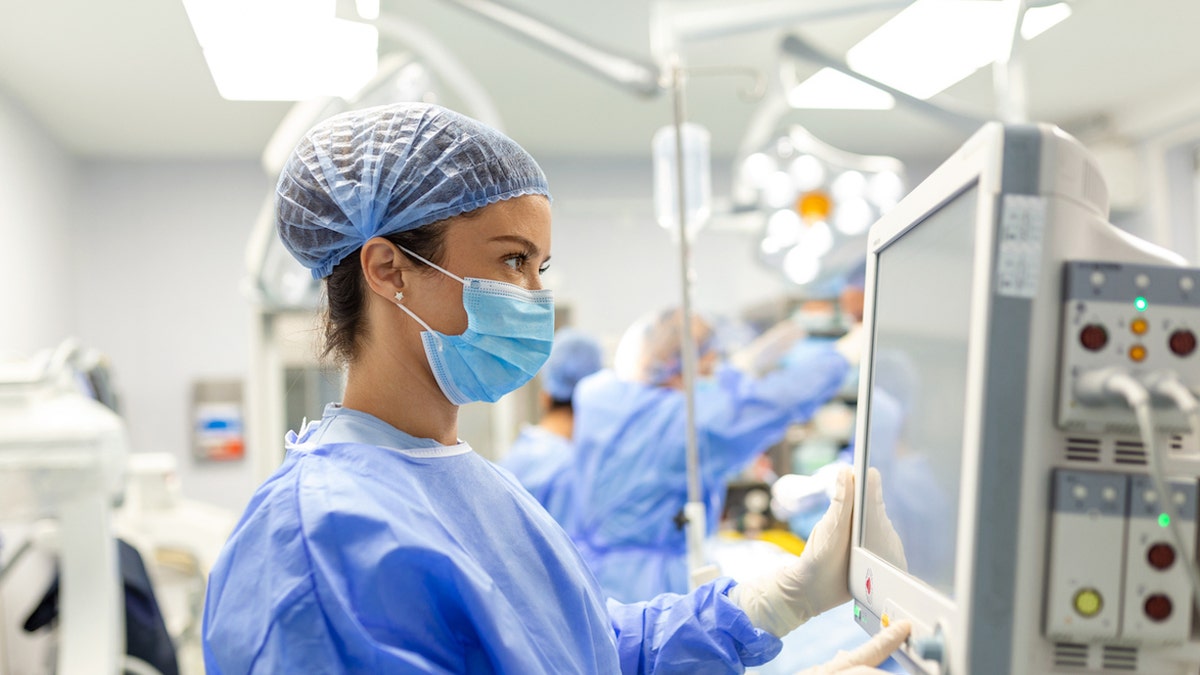Patients taking GLP-1 medications like Ozempic, Wegovy, Mounjaro, and others may experience complications during surgery, recent research reveals.
In a study led by UTHealth Houston, over half of GLP-1 medication users had “significant gastric contents” before surgery, despite following pre-op fasting guidelines, as reported on the university’s website.
This could lead to a potentially life-threatening condition called pulmonary aspiration, where food or liquid is inhaled into the lungs.
OZEMPIC AND WEGOVY COULD DOUBLE AS KIDNEY DISEASE TREATMENT, STUDY SUGGESTS
GLP-1 (glucagon-like peptide) receptor agonists are commonly prescribed for patients with type 2 diabetes (to stabilize blood glucose levels) or obesity (to aid in weight loss).
“These medications slow down digestion, which means food stays in the stomach longer,” said Dr. Alfred Bonati, the founder of the Bonati Spine Institute in Florida.
Patients taking GLP-1 medications like Ozempic, Wegovy, Mounjaro, and others may experience complications during surgery, recent research reveals. (iStock; Getty Images)
Pulmonary aspiration can cause severe lung damage, infections, or even death, Bonati warned.
“General anesthesia can also cause nausea, and the slowed digestion from weight-loss meds can exacerbate this, leading to a higher risk of vomiting during surgery,” he said.
“These medications slow down digestion, which means food stays in the stomach longer.”
Dr. Brett Osborn, a board-certified neurosurgeon and section chief at St. Mary’s Medical Center in Florida, always advises his patients who are taking GLP-1 agonists to stop the medication at least one week before a surgical procedure, he said.
In addition to aspiration, Osborn warned of the increased risk of postoperative ileus, a dysfunction of the intestines after surgery.

GLP-1 (glucagon-like peptide) receptor agonists are commonly prescribed for patients with type 2 diabetes, to stabilize blood glucose levels — or patients with obesity, to assist with weight loss. (iStock)
“This could predispose patients to significant problems, including bowel ischemia (a rare circulatory condition that occurs when blood flow to the intestines is reduced),” he told Fox News Digital.
Healing is a secondary concern among patients taking GLP-1s, according to Osborn.
OZEMPIC BABIES: WOMEN CLAIM WEIGHT-LOSS DRUGS ARE MAKING THEM MORE FERTILE AND EXPERTS AGREE
“Those following a hypocaloric diet, as is the case with patients on GLP-1 agonists, may potentially inhibit healing and recovery from surgery, which requires a caloric surplus, particularly from protein-laden foods,” he said.
Proper nutrition is crucial for tissue recovery, Osborn said.

Proper nutrition is essential to healing after surgery, a doctor said. (iStock)
“By inducing a relative state of malnutrition, these medications can be problematic in perioperative patients.”
Dr. Jean-Carlos Jimenez, medical director at Attune Med Spa in Connecticut, agreed that these medications can lead to complications during surgery.
ASK A DOCTOR: ‘WHAT SHOULD I DO, OR NOT DO, PRIOR TO SURGERY?’
“GLP-1 agonists can cause nausea, vomiting, and something known as delayed gastric emptying, or gastroparesis — which means the stomach takes longer than usual to empty its contents into the small intestines,” he told Fox News Digital via email.
“Residual gastric content can increase the risk of pulmonary aspiration during anesthesia and potentially worsen post-operative recovery.”

Surgery is known to alter blood sugar levels due to stress from the procedure, a doctor noted. (iStock)
Surgery is also known to alter blood sugar levels due to stress from the procedure, Jimenez added.
Due to these risks, doctors agree that patients should review all the medications they’re taking with their surgeon and anesthesiologist.
CLICK HERE TO GET THE FOX NEWS APP
For surgical procedures that require patients to fast or remain on a clear liquid diet, they may need to do this for a longer period of time, said Jimenez.
“The timing of when to stop will depend on the type of GLP-1 agonists a patient uses, but can range from holding the daily dose on the day of surgery to holding the scheduled weekly dose one week before a planned procedure,” he told Fox News Digital.
CLICK HERE TO SIGN UP FOR OUR HEALTH NEWSLETTER
GLP-1s typically can be restarted at the next scheduled dose, but should be carefully monitored by the doctor, he advised.
The timing can depend on the type of surgery and the patient’s overall condition, according to Bonati.






